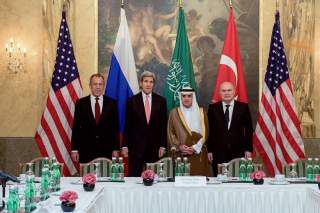Getting from Syrian Peace Talks to Syrian Peace
The Syrian people deserve negotiations that focus on rescuing the idea of Syria itself.
At one level, the U.S. and Russia, by adding a third layer of polarization on top of the local conflict and the regional proxy dynamic, could contribute to the intractability of the Syrian problem and make the situation even more toxic. But at another level, they have the potential to influence the regional players who are caught in the vortex of this conflict. They can attack the negative proxy war system with a more constructive conflict resolution system. Achieving a negotiated transition is so difficult in Syria because the conflict has become both regionalized and internationalized, adding fresh sources of intractability to an already intractable internal situation. Ripeness for resolution can only occur if all three levels—the local, regional and international—come into alignment. The U.S. and Russia are the only states that could possibly pull this off; they enjoy unique diplomatic capabilities to shape the political environment surrounding the conflict, should they choose to leverage them. And they have a special arrow in their quiver: relationships with Arab, Iranian and European partners that can be called upon to shape UN-based transitional arrangements.
The U.S. policy should be to build an international conflict management system. This will be necessary to reinforce the long-term interests of the regional actors, namely Saudi Arabia, Iran and Turkey, and try to de-emphasize the more viscerally felt, shorter-term interests of combating one another through proxy battles in Syria and elsewhere in the Middle East.
The U.S. has more potential power than is often recognized; ironically, Russia’s high-risk military and diplomatic initiatives could offer openings for Western leverage. Having raised the stakes and played some significant coercive cards, Putin needs them to translate into a positive outcome. But he cannot get one unilaterally; Assad and his allies cannot create their own positive endgame or exit ramp. Syria’s downward spiral will likely continue until the local, regional and international players come into some form of alignment.
But they can only do this in Vienna if they focus more on the big picture, explore the possibility of envisioning common interests based on the sanctity of Syria as a state and the goal of encouraging Syrians to become a nation—and focus less initially on the most divisive, “winner-take-all” issues in the negotiation. The focus, especially in preparatory and pre-talks, should be on confronting the underlying dynamics that are now fueling this conflict and that now threaten to further destabilize an entire region of central importance in global security. To be sure, Syria’s war started with the regime’s brutal crackdown on peaceful protesters, and that regime needs to transition to something more inclusive and legitimate. But the conflict has now been transformed, and its solution requires recognition of that reality.
Chester A. Crocker is the James R. Schlesinger professor of strategic studies at Georgetown University’s Walsh School of Foreign Service. From 1981 to 1989, Dr. Crocker served as Assistant Secretary of State for African Affairs. Dr. Crocker chaired the board of the United States Institute of Peace (1992-2004) and continued to serve as a director of this independent, nonpartisan institution through 2011.
Ross Harrison is on the faculty of the School of Foreign Service at Georgetown University and is a scholar at The Middle East Institute in Washington, D.C. Ross is also on the faculty of the political science department at the University of Pittsburgh, where he teaches courses in Middle Eastern politics. Harrison authored Strategic Thinking in 3D: A Guide for National Security, Foreign Policy and Business Professionals (Potomac Books, 2013)
Image: Wikimedia Commons/U.S. Department of State

